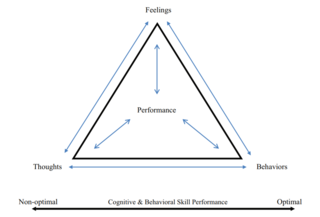
Sport and Competition
Mental Wellness in Sports
Understanding performance optimization and managing upset in sports.
Posted January 17, 2019
Welcome to our blog!
In this blog series we review methods that have been shown to improve mental wellness and sport performance in studies involving intramural, club and NCAA athletes (read more here).
Our hope is that readers can use each post as a “how to” guide for improving performance in real-world situations that affect athletes. To some extent these methods may be applicable to other groups who share unique cultures and require specialized skill sets where optimum performance is essential (e.g., musicians, police, and firefighters). A variety of performance topics will be reviewed based on suggestions of the readers of this blog so send us your requests.
Understanding Optimization
The Performance Triangle highlights our approach to optimization.

The triangle (borrowed from the well-established CBT triangle) shows performance (in the center) is influenced by thoughts, actions, and feelings. Of course, these factors affect one another, sometimes in uncontrollable ways. For instance, a pitcher may experience negative self-statements prior to throwing the ball. Throwing the ball at the ground may in turn lead her to feel frustrated and ultimately negatively affect her focus when throwing future pitches. Most athletes report more difficulty controlling their emotions when compared to controlling thoughts and actions. It's possible to increase control over emotions. However, this usually occurs through the development of skills that are specific to actions or thoughts. Throughout this blog series, we will review performance-based skills and discuss ways to apply and practice them in various life situations, particularly sport scenarios.
We recommend using the optimization scale in the figure below, which suggests that all skills occur somewhere on a continuum from non-optimal to optimal. The scale is best used as a complement to objective measures of performance; a way to think about progress towards goals while ignoring stigma producing references to “problems” or “weaknesses.” Throughout our blog series, you will see that we are very intentional with the language we use. Instead of focusing on “problems” or “pathology,” we encourage goals and strategies specific to “optimization.” Indeed, research has found that focusing on “problems” can actually decrease motivation and confidence.
Managing upset
The management of upset during performance situations is a frequently reported issue. In managing upset, the following two-step process may be helpful. When frustration or negative emotion occurs in a performance situation we teach athletes to immediately (1) focus on what was liked about performance and (2) think of one or two things that can be done to improve future performance. Although this approach may appear to be simple, it can be quite powerful in its ability to facilitate healthy and productive interactions with others, such as coaches, parents, and teammates. Coaches can assist this process in becoming habitual by encouraging athletes to do these 2 steps aloud when athletes make derogatory comments about their performance or in some cases approach coaches for feedback. It most situations it may also be helpful for coaches to discourage athletes from approaching them with negative emotions because coaches may be influenced to reinforce the upset with their attention. Alternatively, training athletes to (1) report what was liked about performance and (2) share what could be done to optimize future performance permits athletes to think objectively and creatively. It also permits coaches to remain cool headed, better assess where their athletes are coming from prior to giving their own feedback, and sets the tone for a focus on solution generation. We believe this process may improve mental wellness through the reduction of stress.
So to summarize, when negative thoughts are experienced:
1. Immediately think or say what was liked about performance.
2. Think or say what could be done to optimize future performance.
References
Donohue, Gavrilova, Y., Galante, M., Gavrilova, E., Loughrana, T., Scott, J., Chow, G., Plant, C., & Allen, D. A. (2018). Controlled evaluation of an optimization approach to mental health and sport performance, Journal of Clinical Sport Psychology, 12, 234 – 267. doi.org/10.1123/jcsp.2017-0054

